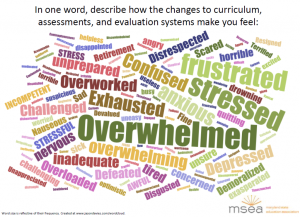I’ve been asked to provide more proof about Common Core and/or national standards not from the ‘early years’ of 2008-2010. It appears folks are having a harder time finding documents from 2011 to present. So, it is in that mindset, I am sharing the following “U.S. Department of Education, For Each and Every Child—A Strategy for Education Equity and Excellence, Washington, D.C., 2013.”
equity-excellence-commission-report
Commission Set Up for Advice:
Were you aware the U.S. Dept. of Education had a special commission that was to give it advice? I sure didn’t, BUT it happened! The commission I’m referring to was the “Equity and Excellence Commission” created by Congress. The Commission was a federal level creation. Their mission? To take a good look at education in America, make a few suggestions and then pass it to Arne Duncan for his perusal. Now, I’m not sure about you, but I would really like to know why the citizens, parents and any other non profiteer of the CCSS, weren’t invited. Who was? I’m so glad you asked! Among the many members ready to give their advice were Linda Darling-Hammond (a very well known CCSS writer, supporter), Dennis Von Roekel, President of the National Educators Association (NEA), the American Federation of Teachers (AFT) was represented by Randi Weingarten, Mike Casserly of the Great City Schools and a Washington Times reporter! You can access the entire panel’s information on page 5. These people above are ardent supporters of Common Core, and even if they aren’t their organizations are! Also supporting all this hard work and warranting thanks by The Commission for their support, “The Broad Foundation, Ford Foundation, Bill & Melinda Gates Foundation, William and Flora Hewlett Foundation, W.K Kellogg Foundation, and the National Public Education Support Fund. Additional thanks go to the National Research Council for their contributions.” Oh, before we move on, the commission’s functions cease when the report 90 days or when suggestions are acted upon. Strange, I thought they were only giving advice, not conditioning it. Be sure you look in the appendices for that tidbit and then who wrote almost every paper used as reference material for this report.
Chastising statement:
What federal document would be complete without a reprimand or a chastising remark? Here’s the one from the Co-Chairs letter,
“For most of our nation’s history, earnest and knowledgeable Americans have debated how to approach our education system and have called for reforms of every description. We’ve debated what to teach and how to teach; what standards to set; how best to train teachers and the basis on which to judge them; the role of testing, what kind of tests should be required, and how often they should be administered; the effects of tracking, homework and social promotion, and of charter schools and vouchers; how to provide adequate and equitable funding; and the role of the federal government, governors, mayors, superintendents, school boards—and teachers, principals, and parents—in school reform. As the adults fight, the children lose.” Sorry, Nanny/Uncle Sam, I don’t need a lecture from you! I wouldn’t be fighting if you’d keep your hands off education!
Key findings in the Report:
First off, why are we using a financial term in an educational setting? No, I don’t mean your Econ 101 class, I mean using a finance or accounting word describing everyone’s education? As in ‘equity’! “Equity” is a term for monetary value (henceforth why we use the word when we are talking about our home’s value). But, I’m digressing..
The opening statement you see in bold letters across the top on page 12 isn’t about our students & their lives, it’s about the economic future of America! ARGH! Please don’t misunderstand, I know the economy is important, but as an educator, I’m much more focused on my students & what they need than I am about a future that’s totally undefined at the moment. It’s like spending so much of your time thinking about the future, that you lose today. Not happening while I’m in charge! The economy will ebb & flow regardless of what my student goes on to aspire to. Don’t overload them with a burden they aren’t ready for.
Many of the same solutions, as some of those featured from the GSV report (an early post on the blog), are also in this Commission’s report. Community learning centers, extended school hours, more ‘cradle to graduation’ incentives, universal Pre-K, recruiting teachers and re-defining teaching, redefining & using your property taxes, etc. (many of these are sprinkled throughout the report)
Constitution? Nah, we don’t need it!
“We(The Commission) have, however, learned from past efforts and believe we are in a position to move forward. There is no constitutional barrier to a greater federal role in financing K-12 education. It is, rather, a question of our nation’s civic and political will; the modest federal contribution that today amounts to approximately 10 percent of national K-12 spending is a matter of custom, not a mandate. The federal government must take bold action in specific areas. Therefore, the commission recommends that the federal government—Direct states, with appropriate incentives, to adopt and implement school finance systems that will (1) provide a meaningful educational opportunity for all students, along with appropriate budgetary and other frameworks to ensure the effective and efficient use of all funds to enable all students to achieve state content and performance standards as outlined above, and (2) demonstrate progress toward implementing such a school finance system. Enact “equity and excellence” legislation that: targets significant new federal funding to schools with high concentrations of low-income students, particularly where achievement gaps exist, to implement meaningful educational opportunities for (and support high academic achievement by) all their students; provides significant financial incentives to states that, in fact, enhance their own funding of schools with high concentrations of low-income, minority and low-performing students; and develops mechanisms that allow the federal government to monitor and enforce the ongoing performance of its new equity and excellence investments to make sure those investments are, in fact, enhancing student achievement. Provide incentives for states to explore and pursue ways to reduce the number of schools with concentrated poverty, because schools without concentrated poverty cost less to run than schools with concentrated poverty.” (from page 19)
Common Core Dreaminess:
If you ever dreamed of finding so much about Common Core in one place, this is it! If you’re like me, your ‘barf bag’ is, also, within reach. Beginning on page 22, near the right hand bottom all the way through to page 27. Large amounts of detail as to why the Standards are the way to go, how they will be the ‘best thing since sliced bread’ (this phrase is not in the report, I’m just being creative), who will have them, how they’ll use them, implications made by using the Standards and so on.
Here’s a ‘teaser’ from page 24, I’m sure you’ll love it so much you won’t be able to keep it to yourself!
“The Common Core State Standards provide not only more economies of scale for wide adoption of best practices, but also new opportunities to innovate across schools, districts and states. And, of great importance, it also provides a framework for aligning teacher training and professional development. Teachers don’t learn to teach; they learn to teach something. They learn how to make the curriculum relevant to the lives of the children they are charged with instructing: how to tie it to those children’s experiences and deliver it to address their special needs. To that end, teachers should have access to a variety of resources, such as model curricular frameworks aligned to the Common Core, curricular materials, units, sample assignments, assessments and the technology that allow them greater flexibility to meet the needs of their students.”
Sorry, I have to ask, don’t folks who want to become teachers go to college to learn to how to teach?! Why, in the name of all that’s holy, does anyone think STANDARDS will teach them how to do things?!! Oh my stars! It appears, the federal government, the Commission and the Dept. of Education all believe, we the people are dumber than a box of rocks.
Please, let any comments about this topic. I’d be very interested in hearing what nuggets of ‘wisdom’ you gleaned from this ludicrous, oh, I meant, ‘excellent’ report.




4 thoughts on “From the Files Tuesday: “Equity, Excellence in Education””